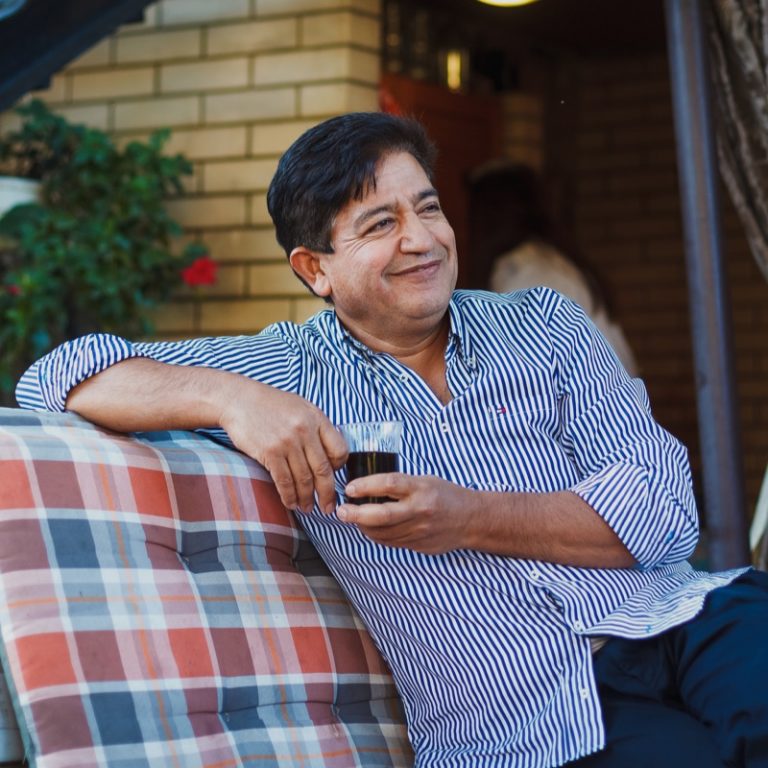The Syrian community in Ukraine began forming during the Soviet times. At first, Syrian students came to study, giving preference mainly to the medical field. In times of Ukraine’s independence, Syria and Ukraine have established active trade relations. Popular areas were wood and fruit trade. The number of Syrian migrants has been gradually increasing since 2012, with the start of the war in Syria, which continues to this day. Many Syrians are forced to leave their homes and travel to other parts of the world for temporary or permanent residence. In Ukraine, most of them start a new life and set up their own business.
Syrians have lived in Ukraine since the Soviet Union times. Some of the first private clinics in independent Ukraine were opened by Syrians who came to study medicine. Since the beginning of the war in Syria, the number of immigrants has increased. According to the UN refugee agency, as of 2018, around 600 Syrians requested shelter in Ukraine. Today, in Kyiv alone, there are around 200 Syrians. Each one of them has a different story. Some came for studies, some created families, some were escaping the horrors of war and found shelter and a chance for a new life in Ukraine.
The Civil war that started in Syria after a series of peaceful protests against the politics of president Bashar al-Assad that caused the biggest humanitarian crisis in the world since the times of the Second World War. Since 2011, over 12.7 millions of Syrians, which is half of the pre-war population, became refugees or were misplaced within the country.

Turki and Maryna
There is a painting on Turki Jabara’s kitchen wall. It was brought from his homeland some time ago. It portrays an old Damascus street: a yard, a well, a fountain around which a family would usually gather for meals and spend time together. Next to the painting, there is an oud (a plucked string instrument — ed.) and a wooden pounder for grinding coffee.
The furniture in the reception of Dr Jabar’s Clinic, which he has been managing for over 14 years, is also from his native Syria:
“I wanted for this place to remind me of my eastern origin so the furniture was ordered from Syria, my first homeland. The masters who made it are originally from the suburbs of Damascus, just like I am. Even the wood that the furniture is made of is from there.”
Ob-gyn Turki Jabara opened his first Ukrainian private practice near Lviv square in 1995 and worked there for about ten years:
“I was one of the first doctors (in Ukraine — ed.) that mustered up the courage to open a private practice. After the institute, I studied in Germany for a year, then one more year in the US. In addition, at the time, I already had experience as a private practitioner in Syria, so it was somewhat easier for me compared to my Ukrainian colleagues.”
Turki says that working as a doctor is considered prestigious in Syria. His father is also a doctor by profession, so he had no hesitation in choosing the same career path.
“In professions rating, the medical field is number one, then comes engineering, law, and so on. Any parents want their child to receive a prestigious education and profession.”


slideshow
Turki went to study to the then-USSR (Ukrainian Soviet Socialist Republic — tr.). He finished Kyiv medical institute (now — Bogomolets National Medical University) and returned to Syria to work as a general practitioner. Later he received a referral for specialisation in obstetrics and gynaecology in Kyiv where he studied for five more years: two in registrarship and three in a graduate school of the medical institute. He met his future wife Maryna during his third year of studies. It happened at a hospital on Taras Shevchenko boulevard, where he had his internship:
“It was in 1991, right here, in this building. I met her in the foyer. I saw her and said, ‘this is my future wife’. Isn’t that right, Maryna Mykolaiivna?”
“Well, you didn’t say it directly.”
“You didn’t know about it.”
“Maybe you thought that? When I first saw him, my knees became weak.”
“Did you fall in love right away?”
“Yes, I did.”
“I hope you continue feeling this way.”
“Of course I do!”
After defending his doctoral thesis, he received an invitation to an internship in Germany. After a year in a Hamburg clinic, he was invited to Los Angeles, where he spent another year, this time together with his wife and a child. After the internship in the US, the couple was faced with a question of where to move back to. The choice was between Syria and Ukraine.
“At that time, I felt the atmosphere in Syria that could turn into a war. It was 1995 and the war only happened 15 years later. But even then I had a feeling that it would not end well.”

During the first visit to Ukraine, Turki Jabara spoke his native Arabic and some English. He learned Russian and later Ukrainian upon arrival. He considers language learning a difficult but necessary task, because in any country a person is perceived through language. He believes that if you want to be respected, you need to know the language perfectly.
In Turki’s group at the medical institute, there were only two other foreign students: a girl from Syria that works as a doctor in Damascus now, and Turki’s good friend who is a radiologist in Jordan. The rest were twelve Soviet students, mostly Ukrainians. According to Turki, the Soviet education system was well thought out for foreign students, as they were integrated into general groups and had a chance to study together with the locals. In Turki’s opinion, this helps foreigners to study the language and local traditions faster, as well as making friends.
Today, Maryna Jabara works as a beautician at her husband’s clinic. She remembers her first visit to Syria with a smile:
“When I first came to Syria, we took a plane and my husband showed me: ‘This is Syria, this is Damascus’. My first question was: ‘Where are the trees?’ Turki still recalls that and laughs. It was my first trip abroad and it was my first introduction to Syria.”
The last Jabara family trip to Syria was in 2011, and they have not been able to visit the country since the beginning of the war. Previously, they would visit Turki’s relatives two or three times a year, during all of the school holidays with their children. For Maryna, Syria became a second homeland during those visits.
“Our children have 27 cousins there (in Syria — ed.). By the time we visit all of them, a few months go by. I adore Syria! I never felt like it was a foreign country. It is extremely beautiful, and the people are very friendly and polite. In any house, you are accepted as one of their own.”
Maryna remembers that when she first came to Turki’s family house, the atmosphere appeared as a never-ending celebration.
“I especially remember the moment when people greet and say goodbye they always kiss each other. Earlier, during the Soviet Union times, such shows of affection were not very common. It was strange to me: people were just going to school or work and would hug each other as if they were leaving for a long time. After coming home they also hug and kiss. I thought, ‘Oh, people, come on!’ But then I got used to it. Now we do the same.”


slideshow
Maryna started learning the Arabic language almost immediately after the wedding. She remembers how they would have guests over and at first, she could not understand what they were talking about amongst themselves. Then Turki found Arabic language classes in Kyiv for his wife. Maryna practised it on her trips to Syria and very soon she was fluent.
Maryna admits that she had no prejudice against her husband’s nationality, but her family members split in their opinions about the marriage:
“My mom had the biggest fear that I would be exchanged for a camel. I don’t know where the Soviet people got this stereotype from that if you marry a foreigner, you will surely be exchanged for a camel. And then when we were married and I told my grandma that my husband and I will come to visit her in her village, do you know what her biggest fear was? ‘How will you go to a local store with him?’ — that was her biggest fear. So it was all great otherwise, but ‘How will I go to the store with him? That’s terrible!’”
At that time, it was not only Maryna’s family that treated the relationship with a foreigner with suspicion but also people from her place of study. She was almost expelled when one of her teachers saw how she was coming out of a car with a yellow license plate (in the USSR, yellow license plates were given to foreign citizens — ed.). Maryna’s classmates stood up for her and they managed to avoid the expulsion. Turki’s relatives were also prejudiced against a marriage with a foreigner:
“My father was against it at first. He had friends that studied in France and then their relationships with their wives fell apart and they divorced. He was afraid that a foreigner would not want to live in Syria. It was a short period of time. When a grandson was born, I think he forgot he was ever against our marriage.”
The war in Syria
Syria is a country in the Middle East that currently borders Lebanon, Israel, Jordan, Iraq, and Turkey. The Syrian culture appeared much earlier than the moment Syria emerged as a state in its modern form. Literacy and the first literary pieces appeared on the territory of modern-day Syria back in the 14th to 12th century B.C.
“Turki took my parents and me to all the corners of the country and I saw it from a completely different angle. Syria is a cradle of civilization. This is where the first alphabet came to be, where St. Mary was born, so these are the facts that are relevant to everyone around the world.”
Syria was an extremely safe country, as Maryna remembers from her first visit. You could easily walk around at night and not be afraid. People were not locking their cars.
“I love Kyiv and I also love Damascus. There is a special family atmosphere, when everyone gathers around the table. Guests start coming midday, around 11-12, and leave after midnight. It is always warm there. You walk the streets and all around you are the aromas of jasmine and oranges. Amazing atmosphere! I am lacking that a lot.”

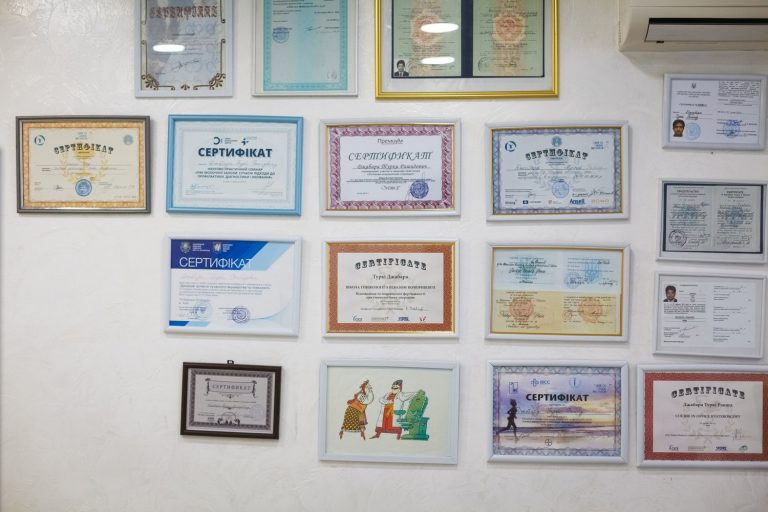
slideshow
The Civil War in Syria began on March 15, 2011 with peaceful protests. The events in Syria were a part of the Arab Spring, a wave of uprisings in the Middle Eastern and North African countries. The protesters were demanding wider freedom and democracy. The Syrians additionally demanded the resignation of President Bashar al-Assad and termination of an almost fifty-year rule of the Ba’ath Party. The Syrian government used tanks and snipers to suppress the protests. After this, in 2012, the protests turned into a civil war. The military officers and civilians in opposition formed combat units under the name of the Free Syrian Army and began armed defence against the regular army. At different stages, various countries intervened, including Russia. In September 2015, at the Syrian government request, Russia intervened in the civil war on the government side. Even before the intervention, Russia was supporting the government by sending military equipment and weapons to Syria. Starting December 3, 2017, Russian forces are located in Syria in permanent military bases.
“The war touched the lives of every Syrian, in one way or another, wherever he or she is located. If it wasn’t for deaths of a relative or a friend, then through material losses. Some people lost homes, apartments, or are no longer able to visit Syria because certain territories are under the control of different groups or the President, who is not legitimate. Everyone has suffered.”
Turki’s mom, sisters and two brothers are staying in Syria. Due to bombardments, many of his relatives lost homes. Turki’s mom had to live in Kuwait for a few years. When the situation stabilised a little, she returned to Damascus. Even though the apartment building where she lives was damaged by a hit of a projectile, she refuses to leave it.
“When the war began in Syria, I was as worried as if it was my own country. We have visited it countless times throughout the years. I fell in love with this country from the first glance. I was always accepted there as one of their own.”

Turki Jabara was a witness to two Ukrainian revolutions. The situation in Ukraine worries him just as much as the situation in his homeland.
“The first Maidan revolution, in 2004, happened because we experienced injustice. I still have a feeling that Ukraine has changed since then. That was the moment when Ukrainians realised that people are the source of power and this will always be a democratic country. It is a very Ukrainian way, as Ukrainians always picked a hetman. During Maidan in 2014, we could not even imagine the upcoming loss of Crimea, the loss of Donetsk and Luhansk. But I hope that with time, everything will return back to its places.”
In his years of living in Ukraine, Turki got used to identifying himself as both a Syrian and a Ukrainian.
“I am distressed from the difficult state that Syria is in. In such moments I consider myself a Syrian. When it comes to Ukraine, when someone speaks badly of Ukraine, I become a Ukrainian and start defending it.”
Maryna says the same about Syria. The couple has one shared dream:
“A dream? For peace to return to Ukraine and Syria. We want to hug people dear to us. We want our nations to live in peace and prosperity because they have suffered enough and deserve it. A single dream.”

Hussam
Hussam al-Yamani, a Syrian architect and designer, comes every day to his friends’ restaurant Linas Caffe to work on his sketches. Today he is drawing a sketch of a futuristic building.
“Imagine a place, for example, in the Podil neighbourhood or any other part of the old town. I know that not everyone likes this, but it is only my imagination. Imagine two old buildings and a new, ultramodern one in between.”
Before the quarantine, Hussam’s office was downtown Kyiv, on Saksahanskoho street. After the lockdown measures were implemented, he gave up that location and started working from home. He used the time in quarantine for gaining additional certification; he took up a few specialised online courses in construction and repurposing buildings for COVID-19 hospitals.
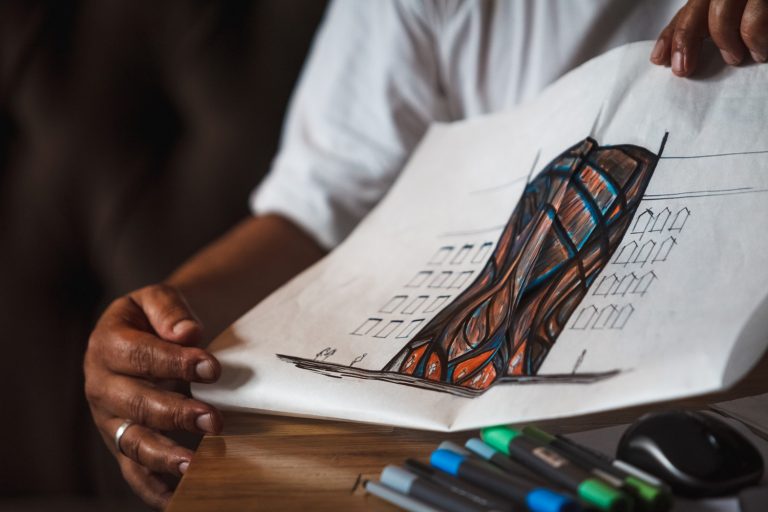
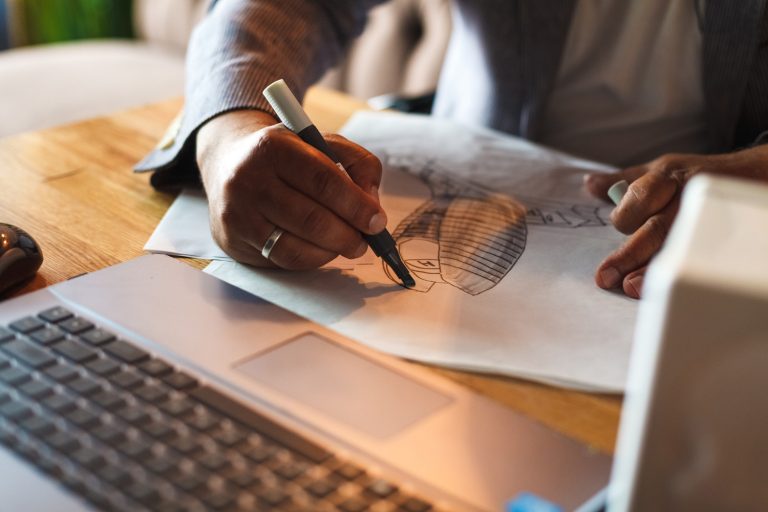
slideshow
Before the start of military action in Syria in 2012, Hussam lived and worked in Damascus, up until his downtown office was destroyed in a bombardment. He lost his business in one moment. Hussam decided to leave his homeland, where his life was in danger. When choosing a country of refuge, he considered Russia, Ukraine, and China, as any of these countries provided a fairly easy procedure for a visa. Ukraine was not a coincidental choice: before 2012, he used to have a business connected with Ukraine.
“I knew the country as I used to export wood to the Persian Gulf countries. I would usually come to the port cities: Odesa or Mykolaiv. So I knew the country, and most importantly I knew people, I knew that Ukrainians are polite and kind. And Ukraine itself is a beautiful country. So when I was told that I can receive a visa to Ukraine, I immediately agreed.”
However, periodically visiting a country for business and relocating there are absolutely different kinds of experience.
“When I came to request refuge, that was my first visit to Kyiv. I came in the morning. The airline lost my luggage. Honestly, it was a horrible day. I took a taxi and went to the hotel. Fortunately, I had a few contacts and in two days I was already able to rent an apartment. That was the beginning of my new life in Ukraine.”
Same as Turki Jabara, Hussam only knew Arab and English languages upon his arrival. He remembers that he met many amazing people who were happy to help him.
“All people have a common language: the language of compassion. People are very genuine here, and if you need help, they will do everything in their power to help. This is what I call the language of compassion.”

When speaking of Ukrainian hospitality, Hussam simultaneously points out a similarity with his own culture:
“There is an ancient tradition in Syria: when a guest comes to stay, he is not asked of the purpose of his visit for the first three days. His comfort is the highest priority. And only on the third day, he is asked, ‘What did you come for?’ or, ‘How can we help you?’ We are very open and we love people. We love hosting and helping people. Hospitality is a part of our culture, which is over ten thousand years old.”
At first, Hussam learned Russian, because, as he remembers, his circle of friends at the time was mostly Russian-speaking. Now he also started learning Ukrainian. He watches Ukrainian movies for practising. He confesses that even though he fully understands Ukrainian, he uses a mixture of Russian and Ukrainian when talking to Ukrainians.
In half a year after moving to Kyiv, with the support of UNHCR Ukraine through grants, Hussam opened a Lebanese restaurant In Mood in the Podil area that was open until 2019. Hussam admits that starting his own business in a new country was difficult, as he needed to study the market and get an understanding of what to offer to a client. Although, for a person who came from a region with rich culinary traditions, the idea of opening a restaurant seemed the most viable.
UNHCR Ukraine
An agency that supports refugees and people who need additional or temporary protection by providing grants for opening small or micro-businesses, beginning or developing farms, or professional courses.As a restaurant owner, Hussam continued to work in architecture and design — an area he dedicated over 20 years of his life to. The first projects in Ukraine were private houses for friends in Kyiv suburbs. As of now the architect has finished ten projects.
“Starting over was difficult because the most important part of an architect’s or a designer’s job is communication. You need to be able to find a common ground with the client as you are creating a lifestyle for them. When there’s no common language, it becomes hard. That’s why I started with projects for clients who speak Arabic, because it is easier to communicate in a native tongue. Then, step by step, as I improved my skills in other languages, I began taking up other projects too.”
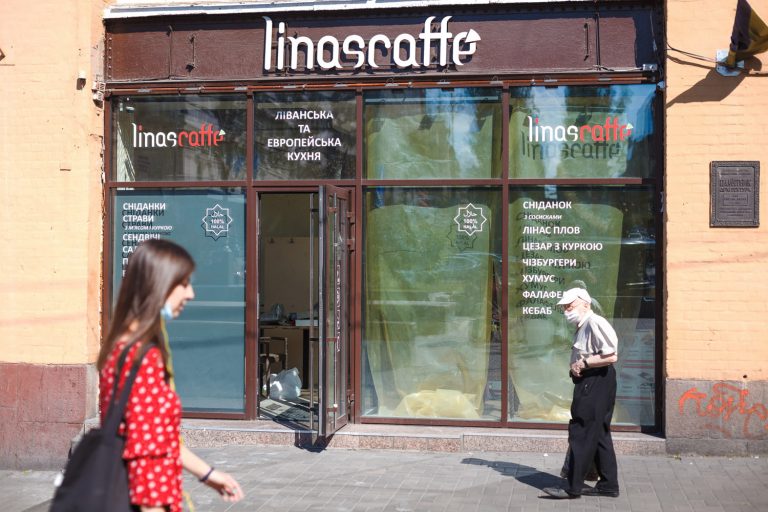

slideshow
Hussam is now working on a few projects in Kyiv as an architect and a designer. His clients are from Syria, Lebanon, and Jordan. The new restaurant projects are the first ones, where he is involved in all of the processes — from the design concept to the smallest details — together with the owners and the chefs.
One of such projects is the re-design for a Lebanese restaurant Beirut, which has been open for over 25 years. The restaurant owners came from Lebanon. During quarantine the visitors flow decreased and the pause was used to completely change the design concept for the restaurant.
Hussam is also working on re-designing a Lebanese–European restaurant Linas Caffe on Bessarabska square. Hussam plans to make an open kitchen there, so that guests could watch the process of cooking the most popular Lebanese dishes: hummus, falafel, baba ganoush (a dish with eggplants), shawarma, and tabbouleh. According to Hussam, Lebanese and Syrian cuisines are very similar, however Lebanese is more popular worldwide.
Hussam is working on the re-design plan for Linas caffe together with the future chef Muhammad Haidar, who is also a chef at an Intercontinental Hotel restaurant in Beirut. He is one of the most known chefs in the Middle East.
Another one of Hussam’s projects is an office building for an Arab-Ukrainian business organisation. The concept for the building has been fully developed, so the construction works will begin right after receiving all of the permits. Hussam dreams of projects for Ukrainian clients as well, because that way he will have a chance to combine the two cultures in his design ideas.
According to Hussam, Kyiv architecture is close to European, and plenty of new buildings appear, some of them with quite interesting design ideas.
“The old buildings in Kyiv are amazing. Kyiv architecture school is unique. After Kyivan Rus was baptised, the Byzantine style came to this territory from Constantinople through Kyiv. Here, in Kyiv, it gained its unique features.”

When homesick, one subconsciously looks for any smallest detail that would associate with the places you love. When you see similarity, home becomes closer.
“When I walk the streets in Podil, I feel like I’m walking the streets of Damascus. Only the scent of jasmine is lacking. Because Damascus is the city of jasmine.”
Hussam has not been home since the war started. And even though he constantly stays in touch with his relatives, he admits that he is not told the whole truth about their life in a country consumed by war. So the main source of information for him is social media and the news.
“We follow the news from Syria every day: from the media, social media, from relatives. The situation is bad, but life goes on. That is what we broadcast to the world: we love life no matter what. We do our work and try to look on the world with optimism and hope for the best.”
Hussam al-Yamani hopes that one day he will be able to invite his Ukrainian friends to Syria. His family, parents and sisters continue living in Damascus despite the tensions, periodical shootings, and bombardments. His parents are elderly and refuse to move and leave their home behind. His sisters also have families and also choose to stay in Syria.
“I miss my family the most, even though I have ways of contacting them at any time. As you get older in your own home, your country, it becomes difficult to make the decision to move, even in such tough times. Because your whole life, your memories, people whom you know and love — they are all next to you.”
When Hussam first arrived in Kyiv, he had the only friend from Syria. Later, he made friends with people from Jordan, Lebanon, Palestine, and his circle of Syrian and Ukrainian friends grew as well. As soon as Ukrainians find out where Hussam came from, they all ask about the situation in Syria.
“People in Syria have different views on what is happening: some support the government, some support the opposition, and there are many that say, ‘We don’t care, we are just tired of war’.”
The war forced Hussam and millions of other Syrians to leave their homes and search for shelter abroad. People mostly settle in the new places, find jobs or start their own businesses. Hussam says that in his time of living in Ukraine he has not encountered any prejudice against his place of origin. Many Syrians come to Ukraine and open shops and stores where they sell fruits and vegetables. Another popular area of business is trading agricultural goods with the Middle Eastern countries.
When so many Syrians were faced with the question of relocating and looking for shelter in another country, many were choosing the former Soviet republics, Ukraine in particular, due to tight connections that stayed even after the fall of the USSR. There is also a significant Ukrainian community in Syria and many Ukrainians marry Syrian citizens.
“Syria is a very beautiful country, very rich, and ancient. In Damascus, there are buildings left from the times of the Roman Empire, the Islamic era, as well as modern architecture. Damascus has unique architecture, known worldwide. Due to war, many architectural objects were affected and we lost many historical monuments. I would want to return to Syria after the war ends and restore and rebuild it.”
Hussam witnessed Ukrainian Revolution of Dignity that started with the protests in Kyiv at the end of 2013. In Syria, everything also started with peaceful protests in 2011, so when it started happening in Ukraine, Hussam saw a lot of common in strivings of both nations.
“I saw the same passion, the same desire for freedom. It became a big step for Ukraine. The country is building trusting relationships with the EU and NATO, and Ukrainians can travel to the Shengen zone visa-free. If not for Maidan, none of it would happen.”

Hussam al-Yamani has sent in a request for Ukrainian citizenship and is waiting for the President to sign the respective decree.
“Ukraine is my home country because home is where you are alive and safe. For me and many other people from Lebanon and Syria, Ukraine became a place to live, work, and grow. Every day I work to develop as a person, as a specialist so that I am able to help Ukraine grow and to be useful to society. For me, having a Ukrainian citizenship is something to be proud of.”
supported by
Material prepared with support of United States Agency for International Development (USAID)


